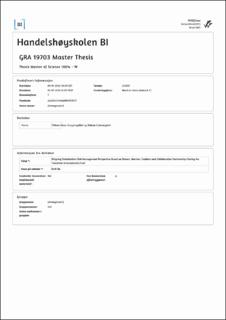| dc.description.abstract | The transition to sustainable fuels in shipping is necessary to satisfy the
requirements set by the International Maritime Organisation and the European
Union. The shipping industry's emission rate is increasing and has the potential to
decrease through greener fuels. The transition poses several risks for shipping
stakeholders. However, this master thesis limits its focus to fuel producers,
shipping companies and ports. This paper analyses how drivers, barriers, enablers
and collaborative partnerships support the three stakeholders' ability to identifyand
mitigate their respective risks considering the transition. A qualitative study
based on expert interviews was conducted to address the topic and answer the
research question adequately. The research is based on nine expert interviews, five
in-depth presentations during our attendance at Nor-Shipping 2023 and literature.
The results revealed the main drivers to be regulations and policies, economic and
financial drivers and sustainability. The main barriers are fuel feasibility barriers
and prices- and costs of greener fuels. The main enablers are fuel feasibility
enablers and economic and financial subsidies to satisfy the stakeholder's
long-term investments due to the industry's capital intensity. The results also
reveal the importance of collaborative partnerships to make progress and strive to
find solutions that collectively benefit all stakeholders. Lastly, the results revealed
identified risks for the three stakeholders and the respective risk mitigation
strategies using the COSO ERM framework. In all essence, the results revealed
that risk management, by addressing drivers and barriers, facilitating enablers and
encouraging collaborative partnerships, decreases the risks that face the three
stakeholders in the transition to greener fuels. | en_US |
